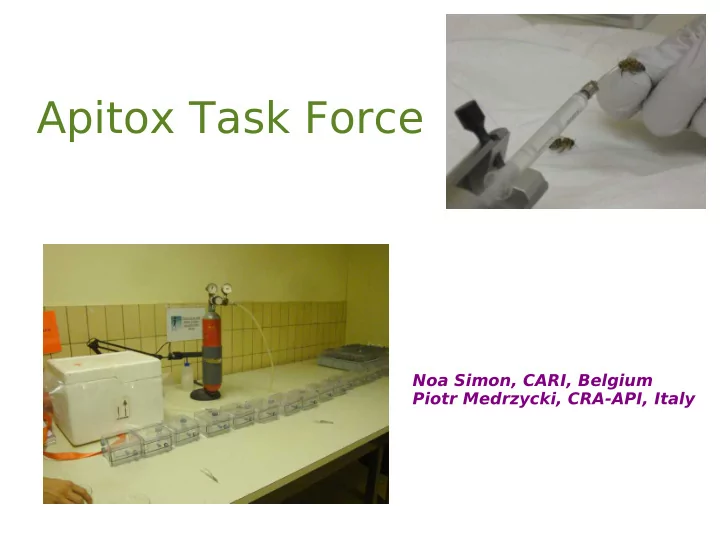

Apitox Task Force Noa Simon, CARI, Belgium Piotr Medrzycki, CRA-API, Italy
Background COLOSS Task Force (TF) APITOX group of independent scientists with interest on bee toxicology created in 2013 at Louvain la Neuve (Belgium) in the framework of the European Beekeeping Congress Beecome
Objective investigate the effects of environmental toxicants on bees design methodology for the study of these effects promote risks assessment protocols that are effective in protecting bees and bee colonies
Objective specific – EFSA GD individuate gaps in EFSA guidelines (e.g. homing flight, honeydew) and propose improvements individuate most important tests that need to be validated organize international working groups for new OECD TG development and for ring-testing fund raising at international level (maybe EC, …)
Main topics bee ecotoxicology exposure to environmental toxicants methodology development and standardisation (BEEBOOK was the first important progress in standardising methods)
Philosophy Scientific rigour + Constructiveness + Independence + Democracy (on-line decisioning)
Members Criteria: ● interest to become a member ● affiliation ● presentation of his/her work ● list of publications ● declaration of interest (DOI) ● COLOSS membership The decision on the acceptance or rejection of the candidature is done on the basis of a vote of the TF members, based on the simple majority.
Past activities 2012 - Before becoming officially a TF, its members met and contributed constructively to the public discussion on the methods for Risk Assessment of Plant Protection Products on bees, carried out by the EFSA
Future perspectives Recruitment of new members Methodological discussions: − Chronic toxicity on adult honeybees and bioaccumulation − Brood feeding tests in lab/in field − Sublethal effects (homing, HPG, flight efficiency) − Synergistic effects − Different exposure routes (e.g. honeydew) − Standardisation of test conditions (e.g. test temperature, bee origin...) − Assessment of disorder symptoms in field − Toxicity tests on SB and BB − Others...
Thank you! Contact: Noa Simon simon@cari.be Piotr Medrzycki piotr.medrzycki@entecra.it
Recommend
More recommend